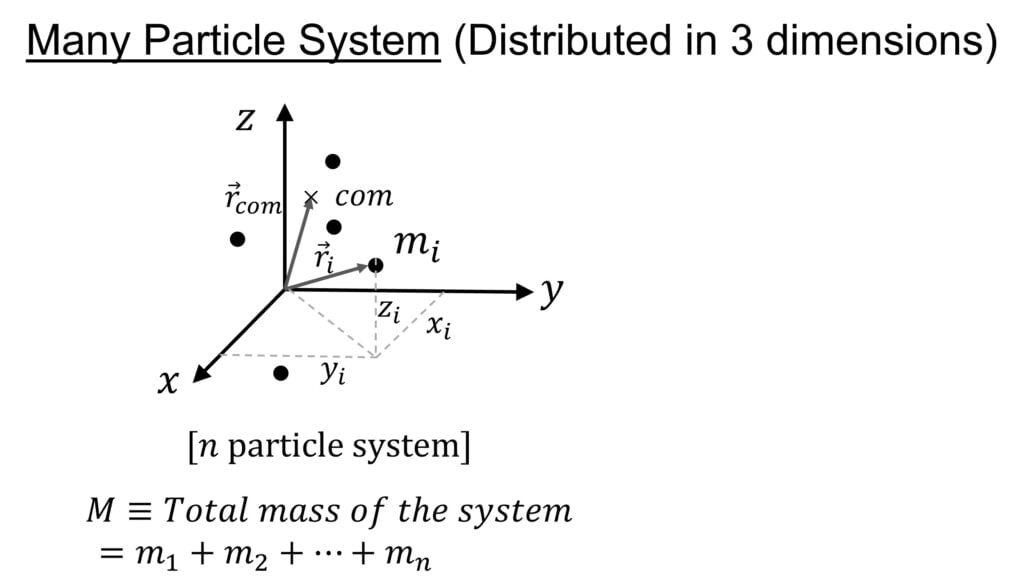Here is the center of mass of two (or more) particle systems
Two Particle System

For the scenario on the left:
$x_{CM} = \cfrac{m_1 x_1 + m_2 x_2}{m_1 + m_2}$ $=x_1 + \cfrac{m_2 d}{m_1 + m_2}$
For the scenario on the right
$x_{CM} = \cfrac{m_2 d}{m_1 + m_2}$
Note:
(i) If $m_1 > m_2$, $x_{CM} < \cfrac{d}{2}$ (i.e. $x_{CM}$ is located closer to $m_1$)
(ii) If $m_1 < m_2$, $x_{CM} > \cfrac{d}{2}$ (i.e. $x_{CM}$ is located closer to $m_2$)
Multiple Particle System

For a system comprising of two or more simple rigid bodies (with the known center of masses), let’s determine the center of mass of the system. OR for a simple rigid body, such as a disc, with a cut out of a standard shape (for example circle or square, etc.), let’s determine its center of mass
$\color{blue}{\text{Solution Steps}}$
A : $x_{cm} =$ $\cfrac{\sum m_i x_i}{\sum m_i}$
$=\cfrac{\sum_A m_ix_i + \sum_B m_ix_i}{m_A+m_B}$
$= \cfrac{m_Ax_{cm,A} + \sum_B m_B x_{cm,B}}{m_A+m_B}$
$y_{cm} = \cfrac{\sum m_i y_i}{\sum m_i}$
$=\cfrac{\sum_A m_iy_i + \sum_B m_iy_i}{m_A+m_B}$
$= \cfrac{m_Ay_{cm,A} + \sum_B m_B y_{cm,B}}{m_A+m_B}$
B) : $\tan \theta = \cfrac{x_{cm}}{L-y_{cm}}$
$x_{cm} = \cfrac{m.0+m.L/2}{2m}, \quad y_{cm}$
$= \cfrac{m.L/2 + m.0}{2m}$
$x_{cm} = y_{cm} = \cfrac{L}{4}$
$\theta = \tan^{-1} \cfrac{1}{3}$
C) : $(m_1 + m_2)x_{cm}$ $= m_1x_{cm,1} + m_2 x_{cm,2}$
$x_{cm} = 0$
$x_{cm,2} = – \cfrac{m_1x_{cm,1}}{m_2}$
To continue to explore center of mass of other commonly encountered shapes, click here…
- Two Particle System
- System of Three Particles
- A group of simple rigid bodies (for example a uniform $I$ shaped lamina
- Non uniform rod of length $L$
- Arc
- Uniform Circular arc
- Semicircular ring
- Semicircular disc
- Annular semicircular disc
- Triangle
- Solid hemisphere
- Hollow hemisphere
- Hollow cone
- Solid cone

